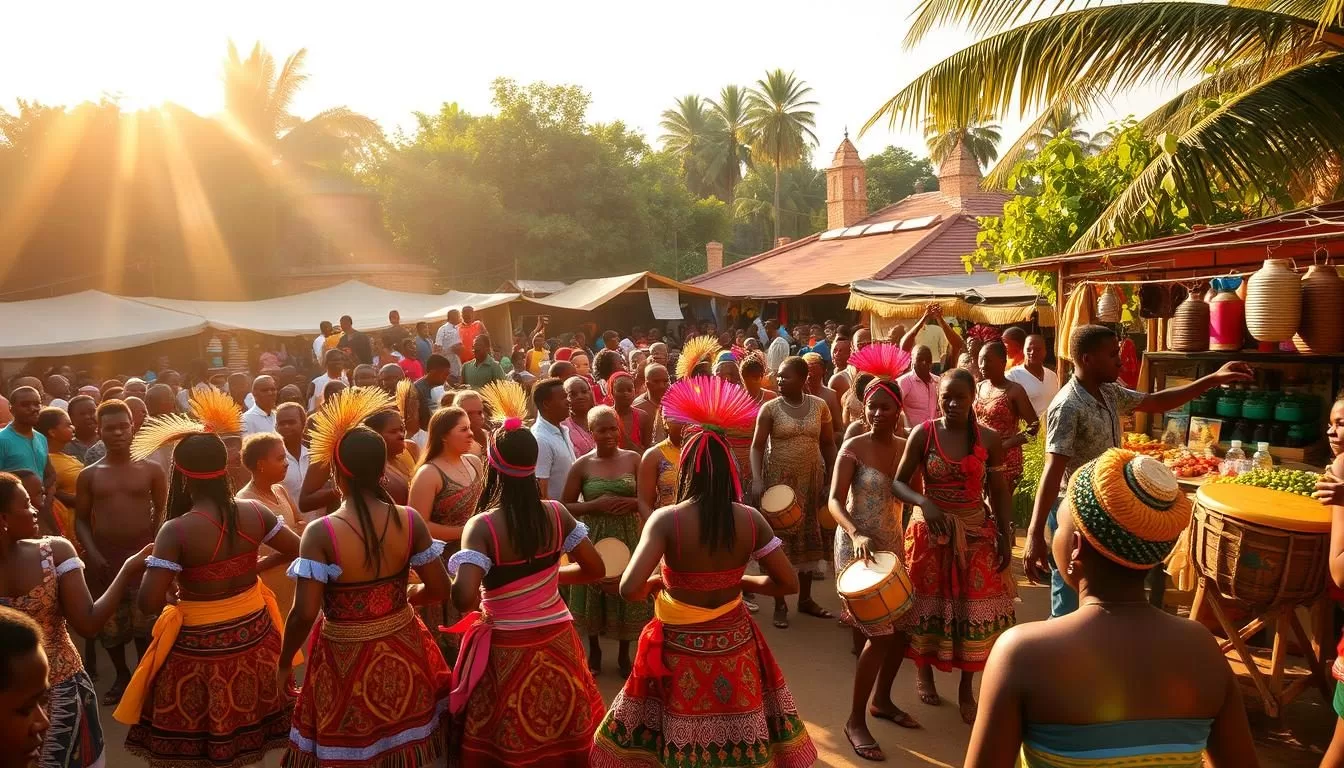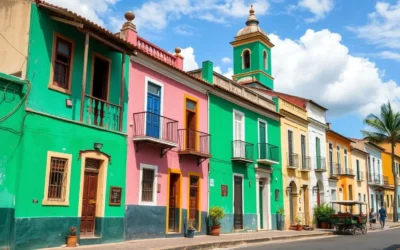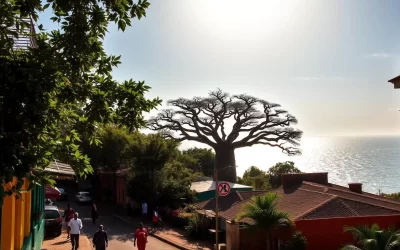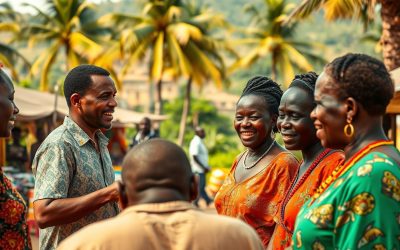✓ Accommodations✓ Flights✓ Rental Cars
Are you ready to immerse yourself in a vibrant cultural experience? Guinea-Bissau’s festivals offer a unique window into the country’s rich heritage, showcasing local traditions, music, and community spirit. As a travel destination, Guinea-Bissau is often overlooked, but its festivals are a hidden gem that can transform your trip into an unforgettable journey.
By attending these festivals, visitors can connect with locals in meaningful ways, gaining a deeper understanding of the culture. This guide will help you navigate the destination‘s most significant celebrations, making your visit a memorable experience that brings you closer to the heart of Guinea-Bissau.
As you plan your trip, this guide will serve as an essential resource, introducing you to the world’s most authentic cultural celebrations and ensuring your journey is filled with unforgettable moments.
The Cultural Significance of Festivals in Guinea-Bissau
In the heart of West Africa lies Guinea-Bissau, a country that boasts a unique cultural identity shaped by its colonial past and diverse ethnic groups. This small West African nation is home to a rich tapestry of culture and traditions that are vibrantly expressed through its various festivals and celebrations.
A Brief Introduction to Guinea-Bissau
Guinea-Bissau is a small country on the west coast of Africa, known for its natural beauty and cultural diversity. As a former Portuguese colony, it has a distinct blend of African and European influences, evident in its food, music, and architecture. The country is also home to many different ethnic groups, each with their own traditions and languages.
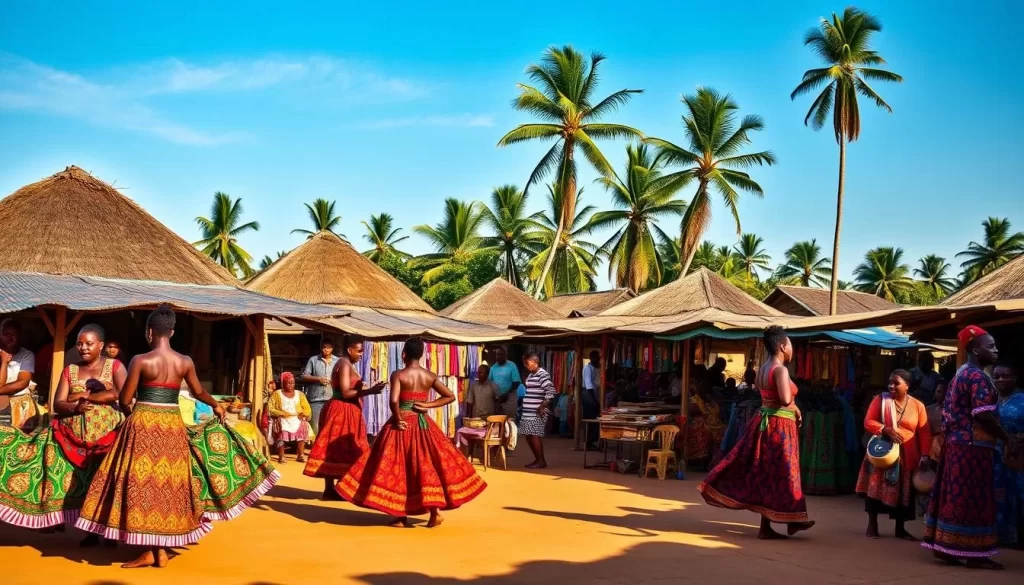
The Role of Celebrations in Guinea-Bissau’s Cultural Identity
Festivals in Guinea-Bissau serve as celebrations that preserve traditional practices, music, dance, and spiritual beliefs. These events function as social glue, strengthening bonds between different ethnic groups and generations. They provide a platform for cultural expression and identity affirmation, making them crucial to the people‘s cultural identity.
How Festivals Connect Past and Present
The historical roots of major festivals in Guinea-Bissau are deeply intertwined with the country‘s complex history, reflecting its journey through colonialism, independence struggles, and modern nation-building. These festivals have evolved from traditional ceremonies, incorporating both ancient practices and contemporary elements. They serve as cultural bridges, connecting visitors with authentic experiences and offering insights into Guinea-Bissau’s traditions that go beyond typical tourism.
Guinea-Bissau: Top Festivals to Check Out When Visiting
The cultural landscape of Guinea-Bissau is dotted with fascinating festivals that are a must-experience for any visitor. These events offer a unique blend of traditional and contemporary culture, showcasing the country’s rich heritage.
Bijagós Archipelago Festival
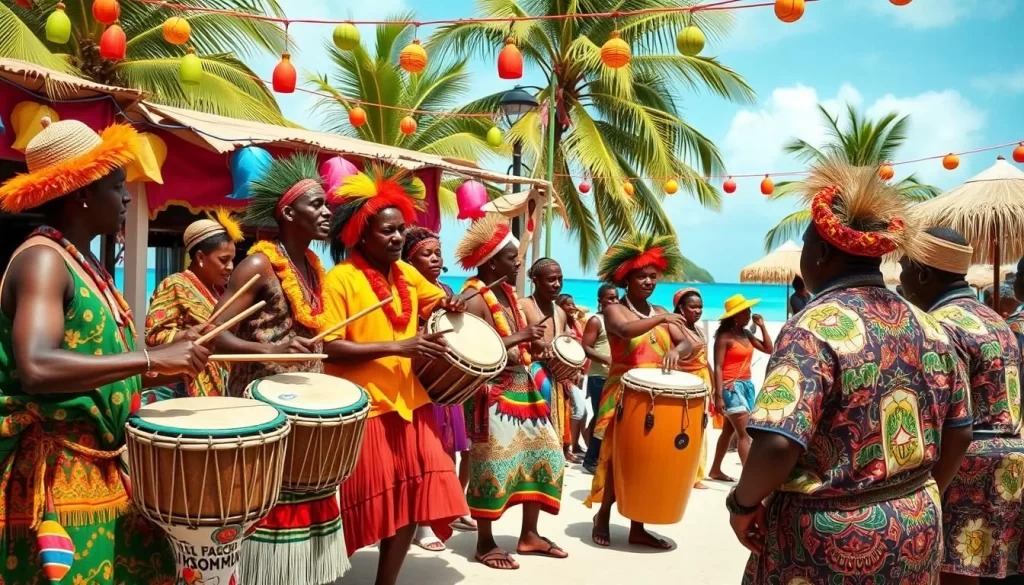
The Bijagós Archipelago Festival is a unique cultural event that takes place in late July. It’s a celebration of the rich traditions of the Bijagós people, featuring a mix of local music genres like traditional drumming and contemporary African beats. The atmosphere is laid-back but vibrant, attracting a diverse crowd, including locals, travelers, and festival-goers looking to immerse themselves in authentic cultural experiences. Typically lasting about a week, it includes not just music but also dance, art exhibitions, and culinary displays, giving you a solid taste of the local culture.
Bubaque Music Festival

The Bubaque Music Festival is a laid-back celebration of local and regional music, usually held in late summer. It features a mix of traditional Guinean sounds, Afrobeat, and some contemporary styles, often showcasing both well-known artists and emerging talents. Expect a friendly crowd, primarily locals and a smattering of adventurous travelers looking for an authentic experience. The vibe is relaxed and communal, with attendees often dancing barefoot on the grass as the sun sets. It typically runs for about three days, allowing plenty of time to soak in the music, mingle, and enjoy some local food.
Carnival in Bissau
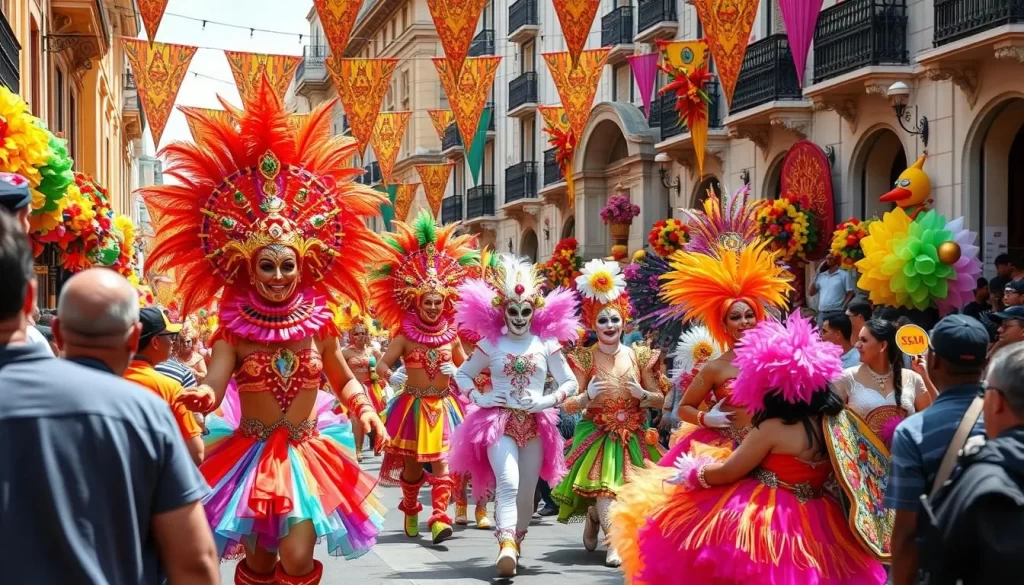
Carnival in Bissau is a vibrant pre-Lenten celebration that blends Portuguese colonial influences with local African traditions. The capital city comes alive with colorful parades, elaborate costumes, infectious music, and street performances that transform the urban landscape. Visitors can experience the city’s energetic atmosphere, sample local food, and engage with the friendly locals.
Tabanca Festival
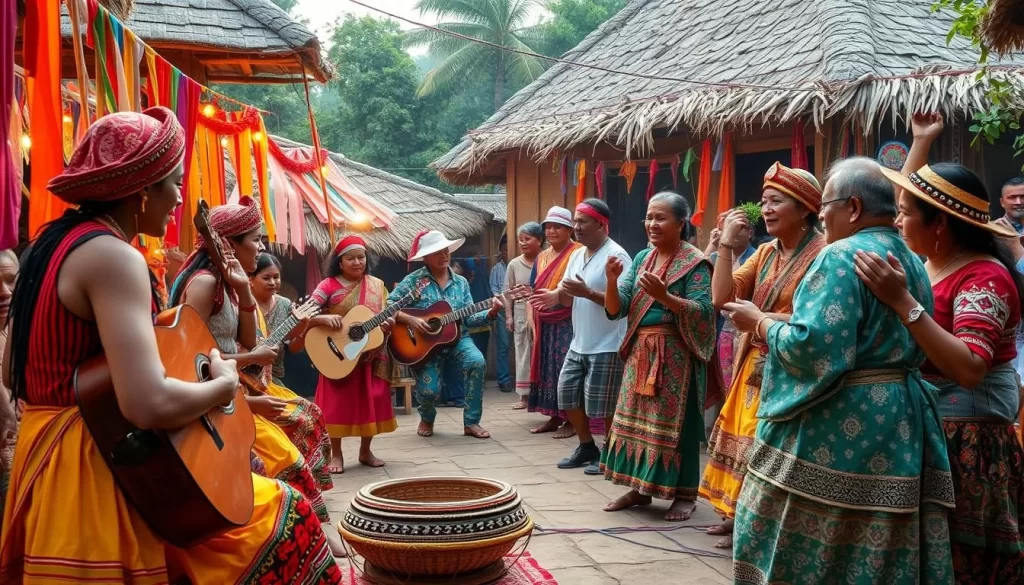
The Tabanca Festival is a culturally significant event that showcases authentic local music, dance, and spiritual practices. It offers visitors rare insights into Guinea-Bissau’s indigenous cultural expressions. The festival is rooted in traditional village celebrations and provides a unique opportunity for travelers to engage with local communities and experience the country’s rich cultural heritage.
Seasonal Festival Calendar and Best Times to Visit
When traveling to Guinea-Bissau, aligning your visit with the country’s festival calendar can significantly enhance your experience. The country’s festivals are deeply rooted in its cultural identity, offering a unique glimpse into its rich heritage.
Dry Season Celebrations (November-May)
The dry season, from November to May, is the best time to visit Guinea-Bissau for festival enthusiasts. During this period, the weather is warm and dry, making it ideal for outdoor celebrations. You can experience the vibrant Carnival in Bissau during February or March, which is a highlight of the country’s festival calendar. Additionally, the Tabanca Festival in February and the April festivals in the Bijagós Archipelago are notable events that take place during this time, attracting visitors from around the world.
The dry season offers reliable weather conditions, making it perfect for outdoor activities such as bird-watching, trekking, and exploring the beautiful beaches and islands. With more sunshine and low humidity, you can fully immerse yourself in the festivities without the hindrance of rain.
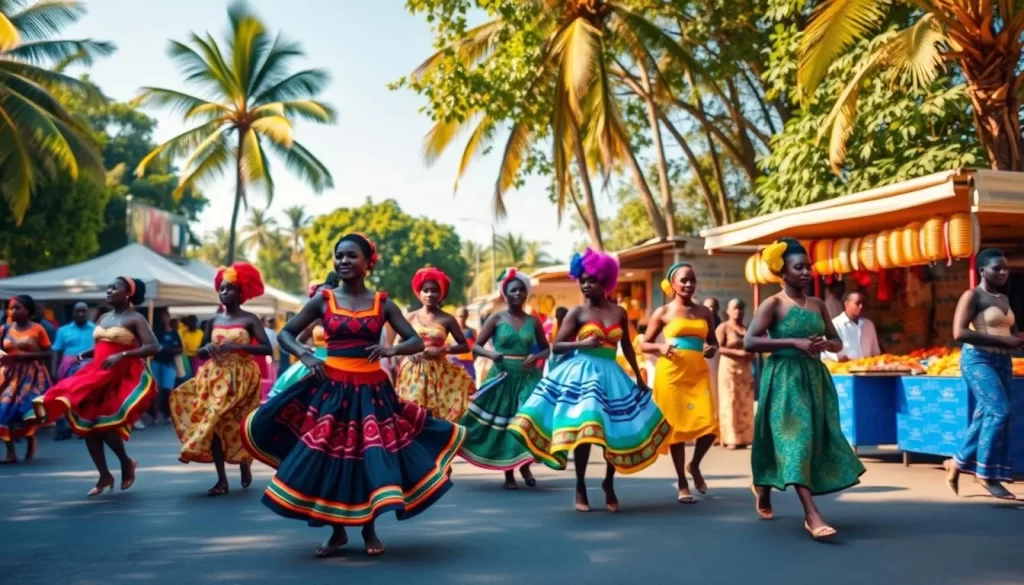
Rainy Season Events (June-October)
Although the rainy season, from June to October, might seem less appealing due to the high temperatures and frequent downpours, it hosts unique cultural events that are worth experiencing. One such event is the Bissau International Film Festival in September, which showcases a diverse range of films from around the world. These events often provide a more intimate experience with fewer tourists, allowing for a deeper connection with the locals.
During the rainy season, you should be prepared for challenging travel conditions, as heavy rainfall can make roads and trails impassable. However, for those who are willing to brave the elements, the rainy season offers a distinct perspective on Guinea-Bissau’s cultural landscape.
Practical Tips for Festival-Goers in Guinea-Bissau
To make the most of your trip to Guinea-Bissau’s vibrant festivals, it’s essential to be well-prepared. Understanding the practical aspects of attending these events will enhance your overall experience and allow you to fully immerse yourself in the local culture.
Transportation and Accommodation Options
When planning your travel to Guinea-Bissau, consider the transportation options available. International flights primarily connect through Lisbon, Dakar, and Casablanca. Once in the country, local transportation includes taxis, shared vans, and boat services, which are essential for reaching festival locations, especially in the Bijagós Archipelago. For accommodation, it’s advisable to book hotels in Bissau in advance, as demand often exceeds supply during festival periods. Options range from basic guesthouses ($10-15 per night) to mid-range hotels ($40-50 per night). Additionally, consider homestay opportunities in smaller communities or temporary festival camping arrangements.
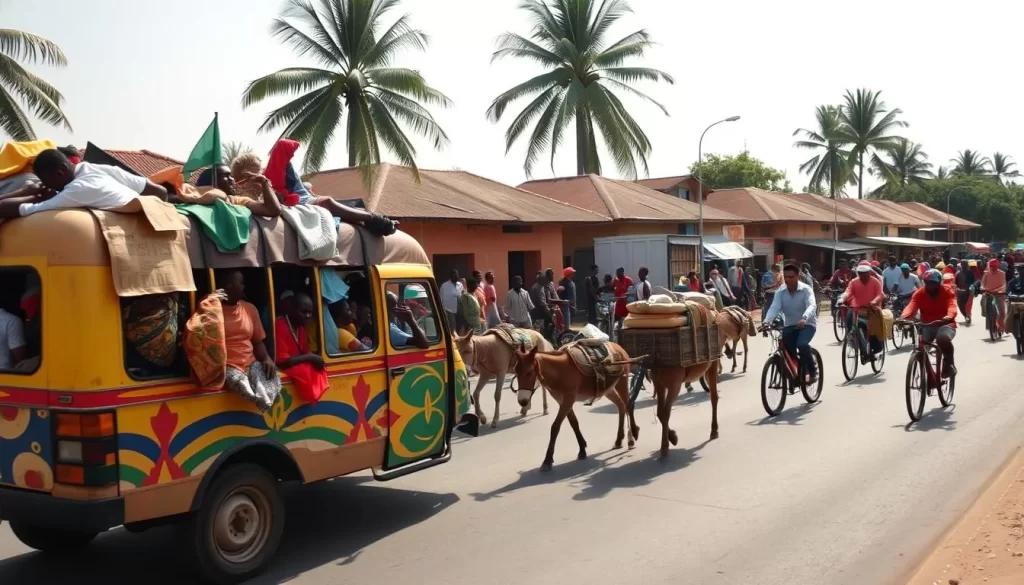
Cultural Etiquette and What to Expect
Respecting local traditions is crucial when participating in Guinea-Bissau’s festivals. Dress modestly for traditional events, and always ask permission before photographing people. Understanding basic Portuguese or Creole phrases can enhance your cultural connections with the locals. Be prepared for a vibrant atmosphere with food, markets, and various activities that showcase the region’s rich heritage.
Packing Essentials for Festival Attendance
When packing for Guinea-Bissau’s festivals, consider the tropical climate and the nature of the events. Include lightweight, modest clothing, sun protection, insect repellent, basic medical supplies, and cash (as credit cards are rarely accepted). Bring portable chargers and appropriate footwear for different festival environments. Your preparation will ensure a comfortable and enjoyable experience amidst the destination‘s lively celebrations.
Health and Safety Considerations
Guinea-Bissau poses some health risks, including malaria and other tropical diseases. Take necessary precautions such as using mosquito repellent, wearing protective clothing, and taking antimalarial medication. Be mindful of food and water safety practices to avoid illness. Stay informed about local conditions and follow security awareness tips to navigate festival crowds safely. Your health and safety should be a top priority during your trip.
Conclusion: Embracing Guinea-Bissau’s Festive Spirit
For those seeking a truly immersive cultural experience, Guinea-Bissau’s festivals provide an unparalleled opportunity to connect with local communities. By participating in these vibrant celebrations, you’ll gain a deeper understanding of the country’s rich cultural heritage and contribute to the local economy.
Guinea-Bissau’s festivals, such as the Bijagós Archipelago Festival and Carnival in Bissau, offer a unique blend of tradition and celebration. As you travel through this West African nation, you’ll discover the warmth of its people and the beauty of its islands and beaches.
To make the most of your festival experience, consider learning basic Portuguese phrases, respecting local customs, and supporting local artisans. With an open mind and flexible attitude, you’ll be rewarded with unforgettable memories and a newfound appreciation for Guinea-Bissau’s culture and traditions. So why not include Guinea-Bissau’s festivals in your future travel plans and experience the authentic spirit of West Africa?
The above is subject to change.
Check back often to TRAVEL.COM for the latest travel tips and deals.
